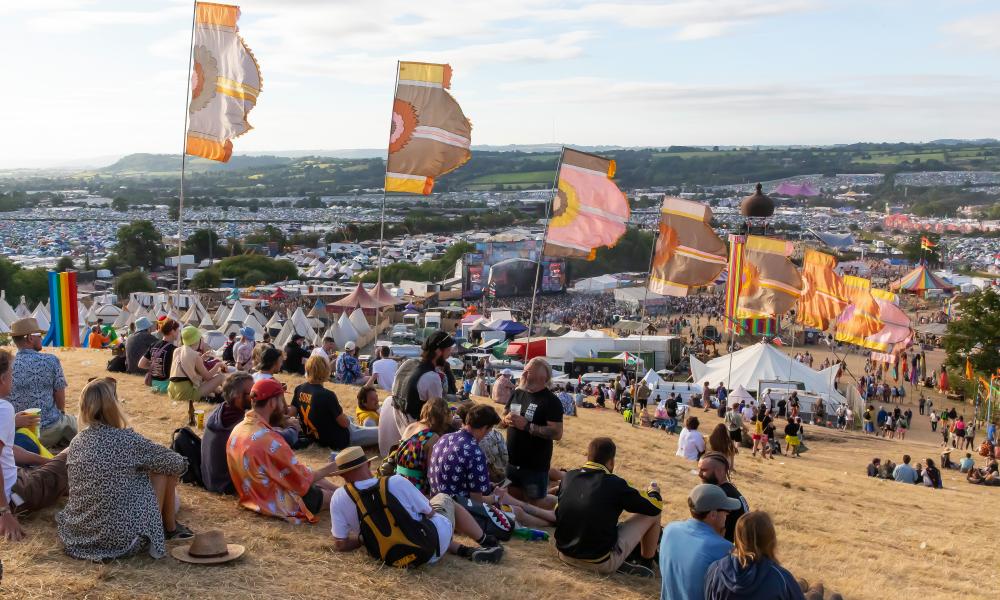
I’LL TAKE YOUR BRAIN TO ANOTHER DIMENSION … MY CLASSICAL DJ SET AT GLASTONBURY
Waterproof trousers, ear plugs and a self-inflating mattress aren’t usually in my presenting kitbag but I’ve just packed away my tent and dug the mud out of my wellies after one of the most surreal gigs of my life: playing a DJ set at Glastonbury.
Several months ago an intriguing invitation came my way. The team at the Free University of Glastonbury asked if I wanted to cross the musical Rubicon and be the first act on at the Crow’s Nest at 11am on the Friday of the festival. Could I get a Glastonbury crowd primed for Coldplay, Black Pumas and Michael Kiwanuka to roar for Bach, Saint-Saëns and Sibelius? I selected an hour’s setlist spanning almost 500-years’ worth of music, told myself not to think too hard about the compost toilet situation, and headed for Worthy Farm.
My main aim was to create an upbeat mood for the hedonism ahead. I decided not to go too “relaxing classics” with my set – I didn’t want anyone nodding off. I wanted to show that classical music can revive and excite as well as relax and de-stress.
The day dawned grey and windy and I felt a degree of trepidation as I peeled myself out of my tent and headed up an exceedingly steep hill to The Crow’s Nest. A hill that had me seriously wondering if any Glasto revellers would ascend at this hour in the morning – would I be playing Rossini and Coates to myself?
I knew I needed a killer opener and I think I had that in Spring from Max Richter’s Recomposed take on Vivaldi’s The Four Seasons. Vivaldi’s original has been overexposed in our own times – how many of us have had to listen to a tinny rendition while on hold to the bank? Richter’s 2012 rethinking stripped the material down, and gave it a minimalist polish but kept the propulsive excitement, and it seemed to catch the ear of my mid-morning crowd. A small group gathered, some looking at me in a quizzical manner but more seemed to be gazing at the view from our hilltop tent as the orchestral music unfolded around us.
I wanted to get a balance between big popular hits and some rarities to whet people’s appetites, so the Intermezzo from Sibelius’s Karelia Suite and Jupiter from Holst’s The Planets were on the list; but so was the 36-part polyphonic explosion of a piece, Deo Gratias, by 15th-century visionary Johannes Ockeghem, and some Joe Hisaishi, the composer behind the score for many a Studio Ghibli classic.
By the third track into the set, the Kanneh-Mason Trio’s arrangement of Bob Marley’s Redemption Song, a larger group had settled. People were lying on the floor but seemed to be conscious. I could assess that from the amount of strawberries they were consuming. There was a big age range, from a group in their early 20s to a couple who looked to be in their 60s. My friends were excited to report that one of the acts that had drawn them to this year’s Glastonbury, spoken word artist Antony Szmierek, was among the crowd.
The biggest reaction came when I played Hannah Peel’s Sunrise Through the Dusty Nebula, an otherworldly masterpiece in which Peel got a 29-piece colliery band to play incredibly high, long sustained notes and then put the results through an analogue synthesiser. There was a moment of near disaster when something very noisy and bass-heavy started up on the Park Stage down the hill beneath us, just as we’d reached pianist Víkingur Ólafsson playing Bach in a glacially beautiful way. All we could do was turn Bach up to a volume that Johann Sebastian himself could only have dreamed of.
Every great DJ set needs to go out on a high, and as I’m not great, nor even actually a DJ, I was relying on a small bespectacled Russian to do that for me: Igor Stravinsky. My last track was the finale from his ballet The Firebird. It’s a masterclass in musical extremes, starting with a hopeful lone horn piercing the sonic landscape, orchestral layers gradually build like the best trance records do, and then the ultimate beat drop. Stravinsky puts a pause in which pulses with expectancy, and then the final bars come racing out, the luminous bird aloft. Stravinsky delivered, and there was a big response from the audience.
It was a joy to show that classical music has life and meaning outside the concert hall, and a place alongside drum’n’bass and indie rock; even if that involved having to sleep on a self-inflating mattress that kept sliding down the hill we’d pitched the tent on. Next year: Puccini on the Pyramid stage?!
2024-07-02T16:16:30Z dg43tfdfdgfd